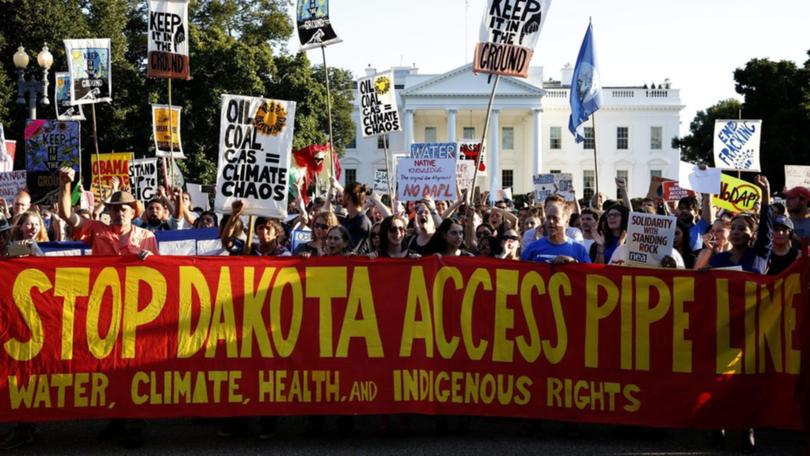Greenpeace ordered to pay $US667 million to Energy Transfer after Dakota protests: jury decides
A US jury has found Greenpeace liable for defamation, ordering it to pay just over $1 billion in damages to a Texas-based oil company.

A North Dakota jury has found Greenpeace liable for defamation, ordering it to pay $US667 million ($1 billion) in damages to a Texas-based oil company.
Energy Transfer accused the environmental group of defamation, trespass, nuisance and civil conspiracy over its role in protests nearly a decade ago against the Dakota Access Pipeline.
The lawsuit, filed in state court, accused Greenpeace of an “unlawful and violent scheme to cause financial harm to Energy Transfer”.
Sign up to The Nightly's newsletters.
Get the first look at the digital newspaper, curated daily stories and breaking headlines delivered to your inbox.
By continuing you agree to our Terms and Privacy Policy.Construction of the Dakota Access Pipeline gained international attention during US President Donald Trump’s first term, as Native American groups set up an encampment trying to block it from passing near Standing Rock.
When asked if Greenpeace plans to appeal, senior legal adviser Deepa Padmanabha said: “We know that this fight is not over.”
Ms Padmanabha added the organisation’s work “is never going stop,” responding to questions about whether the damages amount would end Greenpeace in the United States.
“That’s the really important message today, and we’re just walking out and we’re going to get together and figure out what our next steps are,” Ms Padmanabha said.
An email sent to Energy Transfer for comment was not immediately returned.
“The work of Greenpeace is never going to stop. That’s the really important message today, and we’re just walking out and we’re going to get together and figure out what our next steps are,” Ms Padmanabha added.
The case reaches back to protests in 2016 and 2017 against the Dakota Access oil pipeline and its Missouri River crossing upstream of the Standing Rock Sioux Tribe’s reservation. For years the tribe has opposed the line as a risk to its water supply. The multistate pipeline has been transporting oil since mid-2017.
Energy Transfer’s lawyer Trey Cox has said Greenpeace carried out a scheme to stop the pipeline’s construction.
During opening statements, Mr Cox alleged Greenpeace paid outsiders to come into the area and protest, sent blockade supplies, organised or led protester trainings, and made untrue statements about the project to stop it.
Lawyers for Greenpeace argued the group was not the leader of the protests, but merely helped support “non-violent, direct-action training” to protesters.
Greenpeace representatives have said the lawsuit is a critical test of First Amendment free speech and protest rights and could threaten the organisation’s future.
A spokesperson for Energy Transfer previously said the lawsuit is about Greenpeace not following the law, not free speech.
